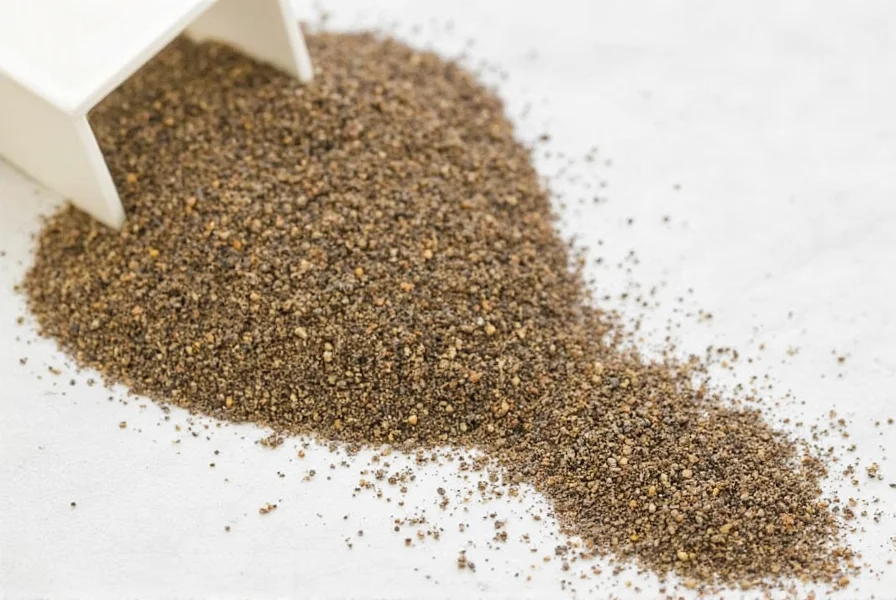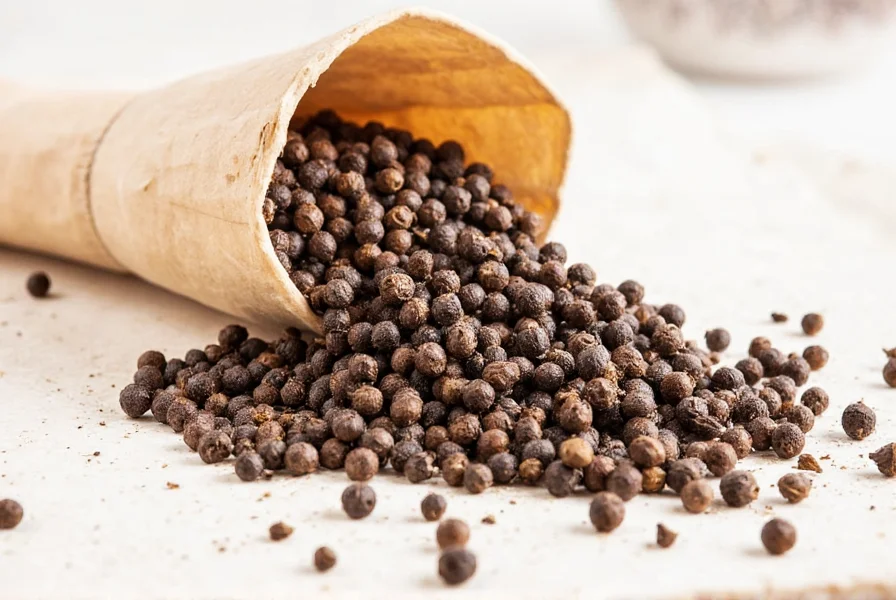Running out of black pepper or need an alternative for dietary reasons? You're not alone. Many home cooks face this dilemma when recipes call for black pepper but circumstances require a substitute. Whether you've depleted your spice rack, have a sensitivity to piperine (black pepper's active compound), or simply want to experiment with different flavor profiles, understanding viable alternatives can rescue your dish without compromising quality.
Why Substitute Black Pepper?
Black pepper, derived from the Piper nigrum plant, provides that distinctive pungent heat many dishes rely on. However, several situations call for alternatives:
- Allergies or sensitivities: Some individuals experience digestive discomfort from piperine
- Dietary restrictions: Certain medical protocols limit black pepper consumption
- Flavor experimentation: Chefs often seek different taste dimensions
- Availability issues: Running out mid-recipe requires quick solutions
- Aesthetic considerations: White dishes benefit from substitutes that don't discolor food
Top Black Pepper Substitutes Explained
White Pepper: The Closest Flavor Match
White pepper comes from the same plant as black pepper but undergoes different processing. Without the outer fruit layer, it delivers a cleaner, earthier flavor with less floral notes. This makes it an excellent substitute when you need to maintain similar heat without dark specks.
Best for: Cream sauces, mashed potatoes, light-colored soups, and dishes where visual appearance matters. Use a 1:1 substitution ratio for most recipes requiring black pepper substitute for cooking.

Cayenne Pepper: For Added Heat
When you need more kick, cayenne provides capsaicin-based heat that differs from black pepper's piperine. It's significantly hotter, so use sparingly. This substitute works well when you want to transform a dish's character rather than maintain the original flavor profile.
Best for: Spicy marinades, chili recipes, and robust meat dishes. Start with 1/8 teaspoon cayenne for every teaspoon of black pepper called for, then adjust to taste. This approach works well as a black pepper alternative for sensitive stomachs when used in moderation.
Paprika: The Mild Option
Whether sweet, smoked, or hot varieties, paprika offers a smoother flavor profile without black pepper's sharp bite. Hungarian paprika provides earthiness while Spanish smoked paprika adds depth. This substitute shines when you want to avoid any peppery heat.
Best for: Egg dishes, roasted vegetables, and tomato-based sauces. Use a 1:1 ratio when seeking a mild substitute for black pepper. Smoked paprika particularly excels as a black pepper replacement in soups and stews.
Allspice: The Complex Alternative
Despite its name, allspice isn't a blend but a single berry that tastes like a combination of cinnamon, nutmeg, and cloves. Its warm, slightly peppery profile makes it surprisingly effective as a black pepper substitute in certain applications.
Best for: Baked goods, hearty stews, and Middle Eastern cuisine. Use 3/4 teaspoon allspice for every teaspoon of black pepper. This works particularly well as a non-peppery substitute for black pepper in slow-cooked dishes.
Coriander: The Citrusy Option
Ground coriander seeds offer a lemony, floral note that can mimic some of black pepper's complexity without the heat. While not a direct flavor match, it provides interesting dimension in recipes where black pepper plays a supporting role rather than starring.
Best for: Fish dishes, salad dressings, and Indian cuisine. Substitute at a 1:1 ratio when looking for what to use instead of black pepper in recipes that benefit from citrus notes.
| Substitute | Flavor Profile | Heat Level | Best Culinary Applications | Substitution Ratio |
|---|---|---|---|---|
| White Pepper | Earthy, clean | Moderate | Cream sauces, light soups | 1:1 |
| Cayenne | Sharp, intense | High | Chili, spicy marinades | 1/8:1 |
| Paprika | Earthy, sweet/smoked | Low to Medium | Egg dishes, roasted vegetables | 1:1 |
| Allspice | Warm, complex | Low | Stews, baked goods | 3/4:1 |
| Coriander | Citrusy, floral | None | Fish, dressings | 1:1 |
Special Considerations for Different Applications
Not all substitutes work equally well across cooking methods. Understanding these nuances helps you select the best black pepper alternative for your specific need:
Cooking vs. Finishing
Black pepper's volatile compounds mean it's often added at the end of cooking. When substituting:
- White pepper: Can withstand longer cooking times better than black pepper
- Cayenne: Heat intensifies with cooking, so add later in the process
- Paprika: Burns easily; add toward the end of cooking for best results
Dietary-Specific Substitutions
For those with digestive sensitivities, certain substitutes work better as a black pepper alternative for sensitive stomachs:
- Mild paprika provides flavor without irritating compounds
- Coriander offers complexity without piperine's effects
- Herb blends like fines herbes can replace pepper's role in seasoning
When Substitution Isn't Advisable
While alternatives exist, some recipes rely fundamentally on black pepper's unique chemistry. Consider keeping black pepper in:
- Creamy sauces where white pepper might create off-flavors
- Classic steak seasoning where the pepper's floral notes are essential
- Recipes specifically designed around black pepper's enzymatic properties
Creating Your Own Custom Blend
For the most versatile black pepper substitute, try this simple blend that works as an excellent black pepper replacement in soups and stews:
- 2 parts white pepper
- 1 part coriander
- 1/2 part allspice
- Pinch of cayenne (optional for heat)
Mix thoroughly and store in an airtight container. Use at a 1:1 ratio in most applications requiring what to use instead of black pepper in recipes.

Frequently Asked Questions
Can I use paprika instead of black pepper in all recipes?
Paprika works well as a mild substitute for black pepper in most savory dishes, but avoid using it in recipes where black pepper's distinctive floral notes are essential. It's particularly effective in tomato-based dishes, eggs, and roasted vegetables, but won't provide the same pungent kick. For heat-sensitive applications, paprika makes an excellent black pepper alternative for sensitive stomachs.
What's the best substitute for black pepper in creamy sauces?
White pepper is traditionally the best substitute for black pepper in creamy sauces and light-colored dishes because it provides similar heat without the dark specks. Use it at a 1:1 ratio. For those seeking a milder option, a small amount of cayenne (1/8 teaspoon per teaspoon of black pepper) can work, but be cautious as heat intensifies during cooking.
How do I substitute black pepper if I have a pepper allergy?
For true pepper allergies, avoid all Piper species (black, white, and green pepper). Safe alternatives include paprika, coriander, allspice, or herb blends. Start with mild options like sweet paprika at a 1:1 ratio, then adjust to taste. This approach provides what to use instead of black pepper in recipes without risking allergic reactions.
Does the substitution ratio change for ground versus whole peppercorns?
Yes, when replacing whole black peppercorns, use half the amount of ground substitutes since grinding releases more flavor compounds. For example, if a recipe calls for 1 teaspoon whole peppercorns, use 1/2 teaspoon of your chosen substitute. This adjustment prevents overpowering your dish when using a black pepper substitute for cooking.
Can I use lemon zest as a black pepper substitute?
Lemon zest can provide a bright, sharp quality similar to black pepper's bite in some applications, particularly fish dishes and salad dressings. Use 1 teaspoon zest for every 1/2 teaspoon black pepper called for. While not a direct substitute, it works well as a non-peppery substitute for black pepper when combined with other spices like coriander for more complex dishes.











 浙公网安备
33010002000092号
浙公网安备
33010002000092号 浙B2-20120091-4
浙B2-20120091-4